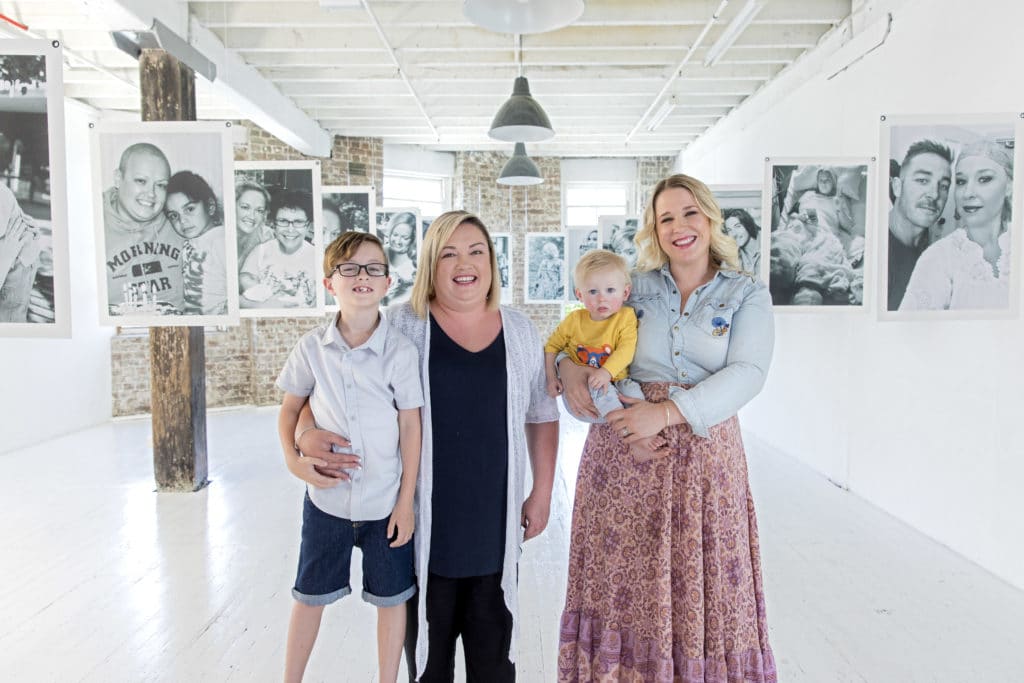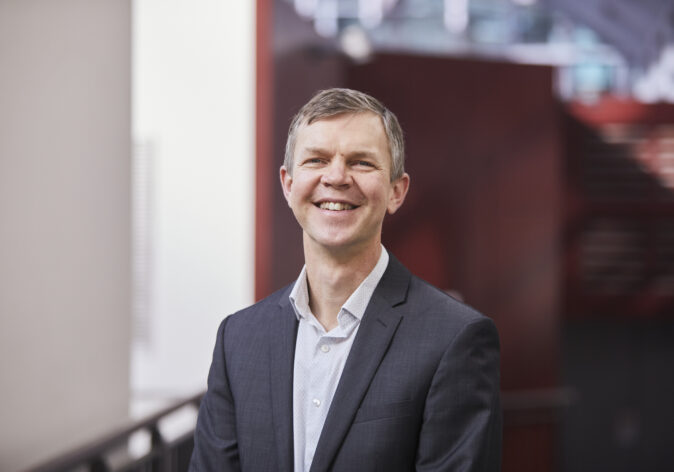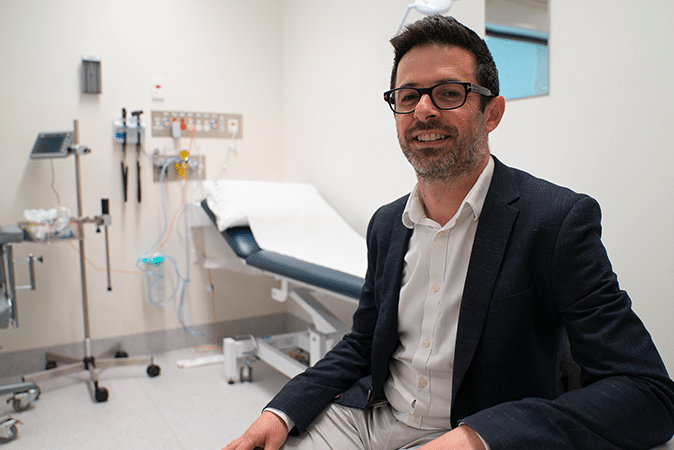Natasha’s Participation In A Clinical Trial Has Helped Women Like Catherine To Have A Baby
There are many difficult things a woman will consider when receiving a breast cancer diagnosis.
For some young women, the ability to have children after their treatment is one of those important considerations.
43-year-old Natasha Eaton was one of those women.
She was diagnosed with triple negative breast cancer more than ten years ago and says the cancer came as a complete shock.
“I was in bed one night and I just rubbed my hand down the side of my breast and felt a lump and I freaked out and went straight to my Aunt’s place and got her to double check, and she said I better get to the doctors straight away” Natasha said.
“I was scared and terrified and it was really… I was shocked, and it was really scary.”
Natasha’s Participation In The POEMS Clinical Trial
Natasha’s oncologist, Professor Fran Boyle, knew how important becoming a mother was to Natasha, so suggested she take part in the POEMS clinical trial conducted in Australia and New Zealand by Breast Cancer Trials.
“I hadn’t really heard much, I knew there was research going on but never really been a part of it. But she was very, she gave me a lot of information, she explained it all to me. I was quite happy to go with her recommendation,” said Natasha.
The POEMS clinical trial offered a new treatment option for women with breast cancer, to better preserve their fertility during cancer treatment.
The chemotherapy many women receive during their breast cancer treatment destroys any remaining cancer cells after surgery to prevent these cells from growing and spreading to other parts of the body.
One in four breast cancer patients like Natasha are pre-menopausal and unfortunately, a common long-term side effect of the chemotherapy is early menopause.
The POEMS study, which stands for the Prevention of Early Menopause Study, took premenopausal women between the ages of 18 and 49 with breast cancer who were receiving chemotherapy and gave them the drug goserelin every four weeks.
Goserelin, sold under the brand name Zoladex, disrupts the body’s hormonal feedback systems, resulting in reduced oestrogen production.
It essentially puts the body into menopause that can be reversed after treatment.
For Natasha, it proved very successful.
She fell pregnant six months after finishing treatment.
“I was really shocked to start with because I was not expecting. It wasn’t something I was trying or anything like that, it was just something that happened, and it was a lot of mixed emotions.”
“I didn’t know what that meant to me medically, whether it was, it’s not recommended. It was a very scary time, but also a joyous time to know that it worked.”
Fast forward ten years and Natasha and her son Jack are happy, healthy and Natasha is cancer free.
Listen to the podcast
Country music star Catherine Britt and POEMS trial participant Natasha talk about their experience with breast cancer and the POEMS clinical trial.
How Catherine Benefited From The POEMS Clinical Trial
Goserelin is now offered to pre-menopausal women during their treatment as part of standard practice and is available on the PBS.
One of those women is Australian country music star Catherine Britt.
Catherine was diagnosed three years ago with stage 2a triple negative breast cancer at age 30.
“There’s so much that goes through your mind,” Catherine said.
“Initially, its pure shock and you don’t really process what’s been said. It feels a little like you’re in a movie or something.
“I was more, checking on everybody else, to make sure my husband and doctor telling me was ok. They were just looking at me like I was crazy,” said Catherine.
“It didn’t hit me until I got to my parent’s house and I said to my husband, how am I supposed to tell my dad that I have breast cancer.”
Catherine also had the added weight of letting her fans in on her diagnosis.
“I wanted to do it properly because once I came around, I wanted to use it as a tool to promote people checking themselves.”
“I’m here today because I’m pro-active about my health, and that’s the only reason, because I’m a total hypochondriac. But it saved my life, and I’ll never feel guilty about that ever again.”
She said it was important to her to be honest about her journey.
“I was on tour, so I had to go on stage and keep touring and I knew, it was like this big deep dark secret that I had to keep, which was a really strange feeling. And then I announced it on my Facebook, the day before my surgery, so I tried to be very open and honest and hopefully inspire people to go check themselves.”
Like Natasha, starting a family was a priority for Catherine.
“I had IVF in case I didn’t come out of menopause and then I went straight into chemotherapy for six months,” said Catherine.
“That was intense.
“Two types of chemotherapy. It was like three weekly for the first three months and then weekly for the last three months, and I got married in there somewhere, and then I had five weeks of radiation.”
As part of her breast cancer treatment, Catherine was offered goserelin and says she didn’t hesitate.
“It was offered to me before I started Chemo and it was a bit of a no brainer for me. I went for it straight away.”
“It was kind of scary. I didn’t know what going into menopause at 30 would be like. Now I know, it’s not fun.
“When I came out of it, the other side and got my period and I knew I could, I was going to be ok, and not long after fell pregnant. It was a pretty-special thing. I’ll never forget that.”
Catherine, like Natasha, didn’t expect to fall pregnant so quickly after treatment.
“I was actually booked in with my IVF doctor to see if everything was all good to go and should we start trying now.”
“I left it a month or two, I waited until my periods were sort of regular and then I had to cancel my appointment because I was pregnant.
“She called me and said ‘Oh my god, it’s a miracle baby. You fell so quickly’. We were very excited.”
How Catherine Benefited From Natasha’s Participation
Catherine appreciates that it’s because of women like Natasha, who have participated in clinical trials research, that her and husband James were able to have little baby Hank.
Catherine and Natasha were given the opportunity to meet and Catherine was able to share her gratitude for Natasha’s involvement in the POEMS clinical trial.
“I’m honestly grateful that she was so brave to do that. I can’t imagine going through all that and then also facing a trial, all this stuff, it would have been so scary and I just feel very proud of her and she’s obviously and amazing woman.”
“I’m really glad I got to meet her.”
Natasha says she encourages anyone who is offered a place on a clinical trial to consider it as it may help you, but also future generations of women and men diagnosed with breast cancer.
“Absolutely, I would recommend a clinical trial. It also helps you, but it also can help so many other people in the future,” said Natasha.
“It’s very exciting to know that something I was a part of, that Hank can be here and probably so many other babies.”
Breast Cancer Trials is the largest, independent, oncology clinical trials research group in Australia and New Zealand. We are committed to finding new and better treatments and prevention strategies for breast cancer through clinical trials research.
Breast Cancer Trials currently has a number open clinical trials. You can find out more at breastcancertrials.org.au or speak with your doctor to see if there is an open clinical trial that’s right for you.
Support Us
Help us to change lives through breast cancer clinical trials research



